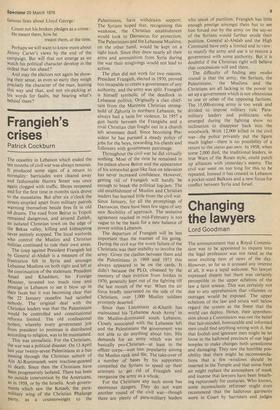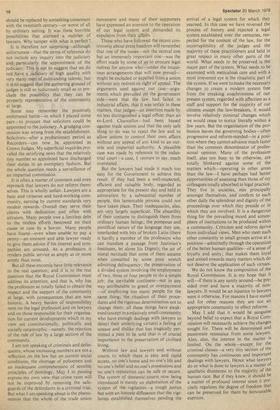Changing the lawyers
Lord Goodman
The announcement that a Royal Commission was to be appointed to inquire into the legal profession was not rated as the most exciting item of news of the day. However, so far as it aroused any interest at all, it was a tepid welcome. No lawyer expressed dissent but there was certainly perceptible in the upper echelons of the law a faint unease. This was certainly not due to any apprehension that villainies or outrages would be exposed. The upper echelons of the law and strata well below regard the system as the finest that the world can deploy. Hence, their apprehension about a Commission was not the belief that fair-minded, honourable and informed men could find anything wrong with it, but that foolish and ignorant men might be let loose in the hallowed precincts of our legal temples to make changes both unwelcome and damaging. They saw the horrible possibility that there might be recommendations that a few •windows should be inserted in the Temple and that some fresh air might replace the atmosphere of musk and incense that lawyers have been breathing rapturously for centuries. Who knows, some inconoclastic reformer might even recommend that the ludicrous garments worn in Court by barristers and judges should be replaced by something consonant with the twentieth century—or worst of all by ordinary suiting. It was these horrible possibilities that alarmed a number of lawyers. Why tamper with what is perfect ?
It is therefore not surprising—although unfortunate—that the terms of reference do not include any inquiry into the judiciary and, particularly the appointment of the judiciary. This is not to suggest that we do not have a judiciary of high quality with very many men of outstanding talents; but it is to suggest that the gathering ground of judges is still so ludicrously small as to preclude the possibility that they can be properly representative of the community at large.
Some may remember the positively embittered battle—in which I played some part—to procure that solicitors could be appointed to the judiciary. A grudging concession was wrung from the establishment. Solicitors—after a probationary period as Recorders—can now be appointed as Crown Judges. My superficial inquiries provided the satisfying news that the relatively tiny number so appointed have discharged their duties in an exemplary fashion. But the whole question needs a surveillance of an impartial commission.
It is often a matter of comment and even reproach that lawyers do not reform themselves. This is wholly unfair. Lawyers are a busy and virtuous and hard-working community, earning by current standards very modest rewards. Overall they serve their clients with dedication and often with altruism. Many people owe a limitless debt to the tireless efforts bestowed on their cause or case by a lawyer. Many people have found—even when unable to pay a penny—an eminent and able lawyer ready to give them advice if his interest and sympathies are aroused. As a profession it renders public service as amply as or more amply than most.
But all these encomia have little relevance to the real question; and it is to the real question that the Royal Commission must address its attention, and that is, why has the profession so totally failed to obtain the respect and the support of the community at large, with consequences that are now historic. A heavy burden of responsibility rests on the legal profession and on lawyers and on those responsible for their organisation for current developments which in my view are constitutionally, politically and socially catastrophic—namely, the rejection of the rule of law by a large section of the community.
I am not speaking of criminals and delinquents, whose increasing numbers are not a reflection on the law but on current social conditions, the shortage of policemen and an inadequate comprehension of sensible principles of penology. May I in passing express my own view that crime rates will not be improved by removing the safeguards of the defendants in a criminal trial. But what I am speaking about is the phenomenon that the whole of the trade union movement and many of their supporters have expressed an aversion to the operation of our legal system and demanded its expulsion from their affairs.
Those who have followed the recent controversy about press freedom will remember that one of the issues—not the central one but an immensely important one—was the effort made by some of us to procure legal redress for anyone who—under the iniquitous arrangements that will now prevail— might be excluded or expelled from a union without any redress or right of appeal. The arguments used against our case—arguments which prevailed on the government side—were that the law had failed in industrial affairs, that it was unfair in these matters, that judvs—an assertion made by no less distinguished a legal officer than an ex-Lord Chancellor—had been biased against trade unions and that the only safe thing to do was to reject the law and to allow unions to control their own affairs without any appeal of any kind to an outside and impartial authority. A plausible case was made by reference to the industrial court—a case, I venture to say, much overstated.
But the lawyers had made it much too easy for the Government to achieve this result. If they had been a well-respected, efficient and valuable body, regarded as appropriate for the present day and held in admiration by a substantial number of people, this lamentable process could not have taken place. Their inadequacies, alas, are very largely superficial. The absurdity of their costume to distinguish them from ordinary human beings; the pompous and pontifical nature of the language they use, interlarded with bits of broken Latin (there is hardly a member of the profession who can translate a passage from Justinian's Institutes, let alone his Digest); the air of moral rectitude that some of them assume when consulted by some poor wretch admitting delinquency; the preservation of a divided system involving the employment of two, three or four people to do a simple job; the inevitable costliness—not in any way attributable to greed or overpayment —of employing too many people for the same thing; the ritualism of their procedures and the rigorous determination not to change them; all these things have awakened (except in a relatively small community who have enough dealings with lawyers to detect their underlying virtues) a feeling of unease and dislike that has tragically permitted a pass to be sold that is of crucial importance to the preservation of civilised living.
Without law and lawyers and without courts to which there is easy and rapid access, no one's home and no one's life and no one's belief and no one's possessions and no one's reputation can be safe or secure. The system of domestic courts now being introduced is merely an elaboration of the system of the vigilantes—a rough justice but with an historic diffeaence that the vigilantes established themselves pending the arrival of a legal system for which they yearned. In this case we have reversed the process of history and rejected a legal system established over the centuries, respected for the content of the law, for the incorruptibility of the judges and the majority of these practitioners and held in great respect in many other parts of the world. What needs to be preserved is the major part of the system. What needs to be examined with meticulous care and with a most irreverent eye is the ritualistic part of the system. If we were to make the necessary changes to create a modern system free from the creaking anachronisms of our present system, regarded with affection as a staff and support for the majority of our citizens except the law-breakers, it would involve relatively minimal changes which we would cease to notice literally within a few years. But the organisation of the profession leaves the governing bodies—often progressive and reform-minded--in a position where they cannot advance much faster than the common denominator of professional opinion. Many of the profession itself, alas too busy to be otherwise, are totally blinkered against some of the matters which—operating in other areas than the law—I have perhaps had better opportunities of assessing than those of my colleagues totally absorbed in legal practice. They live in societies, mix principally amongst themselves, and confirm to each other daily the splendour and dignity of the proceedings over which they preside or in which they are involved. It is a dangerous thing for the prevailing mood and atmosphere of institutions to be produced within a community. Criticism and reform derive from individual views. Men who meet each other constantly in small groups arrive at a position—admittedly through the operation of the better human qualities—of a sense of loyalty and unity; that makes them loyal and united towards many matters which do not deserve the application of such virtues.
We do not know the composition of the Royal Commission. It is my hope that it will—if there is any sanity around—be presided over and have a majority of nonlawyers. It would be an injustice to lawyers were it otherwise. For reasons I have stated and for other reasons they are not an appropriate community to effect reforms.
May I add that it would be sanguine beyond belief to expect that a Royal Commission will necessarily achieve the changes sought for. There will be determined and passionate resistance from some lawyers. Also, alas, the interest in the matter is limited. On the whole—except for the criminal classes—a very tiny section of the community has continuous and important dealings with lawyers. Hence what lawyers do or what is done to lawyers is a matter of apathetic disinterest to the majority of the human race. But if they knew, it should be a matter of profound interest since it precisely regulates the degree of freedom that can be preserved for them by honourable exertion.



































 Previous page
Previous page